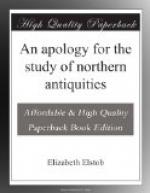Me all too mean for such a Task I weet.
Again,
Grasps he the Bolt? we ask, when he has hurl’d the Flame.
And,
Nor found they lagg’d too slow, nor flew too fast.
And again,
With Fear and with Desire,
with Joy and Pain
She sees and runs to meet
him on the Plain.
And,
With all his Rage, and Dread, and Grief, and Care.
In his Poem in answer to Mrs. Eliz. Singer, on her Poem upon Love and Friendship,
And dies in Woe, that thou may’st live in Peace.
The only farther Example of Monosyllabick Verses I shall insert here, and which I cannot well omit, is what I wou’d desire the Author to apply to his own Censure of Monosyllables, they are these which follow;
Then since you now have done your
worst,
Pray leave me where you found me first.
Part of the seventh Epistle
of the first Book of Horace
imitated, and address’d to a noble
Peer, p. ult.
After so many Authorities of the Gentlemen, these few Instances from some of our Female Poets, may I hope be permitted to take place. I will begin with Mrs. Philips on the Death of the Queen of Bohemia;
Over all Hearts and her own Griefs she reign’d.
And on the Marriage of the Lord Dungannon,
May the vast Sea for your sake quit his Pride,
And grow so smooth, while on his Breast you ride,
As may not only bring you to your Port,
But shew how all things do your Virtues court.
To Gilbert Lord Archbishop of Canterbury,
That the same Wing may over
her be cast,
Where the best Church of all
the World is plac’d.
Mrs. Wharton upon the Lamentations of Jeremiah;
Behold those Griefs which
no one can repeat,
Her Fall is steep, and all
her Foes are great.
And my Lady Winchelsea in her Poem entituled, The Poor Man’s Lamb;
Thus wash’d in Tears,
thy Soul as fair does show
As the first Fleece, which
on the Lamb does grow.
Sir, from these numerous Instances, out of the Writings of our greatest and noblest Poets, it is apparent, That had the Enmity against Monosyllables, with which there are some who make so great a Clamour, been so great in all Times, we must have been deprived of some of the best Lines, and finest Flowers, that are to be met with in the beautiful Garden of our English Posie. Perhaps this may put our Countreymen upon studying with greater Niceness the use of these kind of Words, as well in the Heroick Compositions, as in the softer and more gentle Strains. I speak not this, upon Confidence of any Judgment I have in Poetry, but according to that Skill, which is natural to the Musick of a Northern Ear, which, if it be deficient, as I shall not be very obstinate in its Defence, I beg leave it may at least be permitted the Benefit of Mr. Dryden’s Apology, for the Musick of old Father Chaucer’s Numbers, “That there is the rude Sweetness of a Scotch Tune in it, which is natural and pleasing, tho’ not perfect.”




